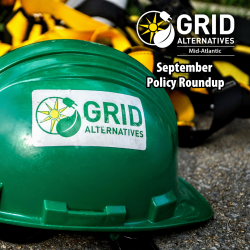Achieving our clean energy goals depends on our workforce development initiatives.
We have come a long way to create an environment where solar energy can thrive. The economy is ripe for solar energy investment. The Inflation Reduction Act, passed last year, paves the way for a massive solar deployment.
Despite these sunny conditions, solar energy won't change our future unless there is a workforce to implement it. As the Interstate Renewable Energies Council wrote in its 2022 Solar Jobs Census:
"It will be no easy task to train, recruit, and retain the qualified women and men who will be needed to work in these industries. Clean energy companies will need to adopt conscious and directed workforce development strategies to develop a pipeline of highly skilled candidates and employees."
People are key to a clean energy transition. That concept is central to GRID Mid-Atlantic's work in the community and beyond.
Here's the policy roundup for the Mid-Atlantic and beyond:
Federal
It’s Climate Week! The Biden-Harris Administration has marked the occasion with several major announcements of climate initiatives that build on the kinds of advocacy and real-world successes that GRID Mid-Atlantic has achieved over the years.
One such announcement launched the American Climate Corps, an initiative to provide paid workforce training opportunities, starting with 20,000 participants, in fields including clean energy deployment. GRID Mid-Atlantic has long supported such an initiative, which was included in earlier versions of what became the Inflation Reduction Act but dropped from the final law.
Other states, including Maryland, are also moving forward with their own climate corps funded through public-private partnerships, including AmeriCorps, which will work with the American Climate Corps as implementing collaborators. AmeriCorps, a supporter of GRID’s SolarCorps, is also standing up a new hub associated with the Biden initiative.
District of Columbia
The D.C. Council has returned from its summer recess with a packed schedule. Their agenda includes helping communities get the affordable green housing, energy savings, healthy environment, and family-sustaining jobs they need and deserve.
GRID Mid-Atlantic joined a letter to the Council urging it to recognize access to utilities as a human right. The letter also asked the Council to prohibit most disconnections for non-payment and promote energy justice.
Separately, we teamed up with other organizations calling the Council to pass the Healthy Homes Act. The act would establish a program to provide no-cost or reduced-cost electrification retrofits to income-qualified households. Methane gas has been shown to leak from outside and inside homes, causing rapid climate warming as well as other threats to health and safety.
There’s also the Green New Deal for Housing Act, which would create a new city office to oversee the development of mixed-income housing meeting net-zero emission standards.
Local agencies continue to engage with local stakeholders like GRID Mid-Atlantic on how to distribute federal funding. The DC Department of Energy and Environment (DOEE) is seeking input on federal Climate Pollution Reduction Grants. It was awarded $3 million in the first phase for planning, and will compete for funds from the $4.6 billion total second phase announced by EPA this week. Shout-out to DOEE for prioritizing equity, energy justice, and career pathways in its work.
Maryland
Earlier this month the University of Maryland hosted its ninth annual Symposium on Environmental Justice and Health Disparities. The event was led by the Center for Community Engagement, Environmental Justice, and Health (CEEJH), founded by Dr. Sacoby Wilson. It brought together visionary leaders from around the world to share learning on a wide range of urgent topics, including equitable solar investment. Check out an event recap on CEEJH’s YouTube channel.
GRID Mid-Atlantic is also participating in Maryland’s planning processes for its Solar for All application to the U.S. EPA. This work emphasizes the importance of inclusive job training for a inclusive clean energy industry. Meanwhile, the entity leading that charge, the Maryland Clean Energy Center (MCEC), is preparing for next month’s Maryland Clean Energy Summit, while the regional Solar Focus conference will be held in Baltimore in November, reflecting the state’s climate policy leadership.
Virginia
As Virginia, its utilities, and its residents continue to navigate sometimes-conflicting policy demands, GRID Mid-Atlantic supports the great work of Virginia Energy and the Clean Energy Advisory Board on Virginia’s Solar for All application. The Commonwealth’s proposal would include single-family rooftop solar, multifamily solar + storage, residential-serving community solar, and enabling upgrades, allowing Virginians a range of options for benefiting from local renewable energy.
We also applaud the State Corporation Commission’s rejection of high rooftop solar interconnection fees in Dominion utility territory, which includes populous areas such as Northern Virginia, Richmond, and Charlottesville, among others.

